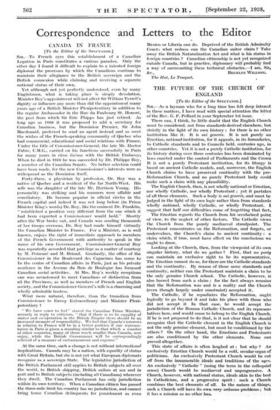THE FUTURE OF THE CHURCH OF ENGLAND [To the Editor
of the SPECTATOR.]
Sm,—As a layman who for a long time has felt deep interest in these matters, I have read with special attention the letter of the Rev. G. F. Pollard in your September 1st issue.
There can, I think, be little doubt that the English Church must be considered. not from standards derived elsewhere, but strictly in the light of its own history : for there is no other institution like it. It is sui generis. It is not purely an Erastian, national institution, for it appeals, in its formularies, to Catholic standards and to Councils held, centuries ago, in other countries. Yet it is not a purely Catholic institution, for its history during over three centuries has been dominated by laws enacted under the control of Parliaments and the Crown It is not a purely Protestant institution, for its liturgy is based on ancient Catholic models, and, moreover, the English Church claims to have preserved continuity with the pre- Reformation Church, and no purely Protestant body could make such a claim with any plausibility.
The English Church, then, is not wholly national or Erastian, nor wholly Catholic, nor wholly Protestant ; yet it partakes of all those elements. Such a body is sui generis, and must be judged in the light of its own logic rather than from standards wholly national, wholly Catholic, or wholly Protestant. I suggest that half our difficulties come of forgetting that fact.
The Erastian regards the Church from his secularized point of view, to the neglect of other factors. The Catholic views the Church from the purely mediaeval standpoint. The Protestant concentrates on the Reformation, and forgets, or undervalues, the Church's claim to ancient continuity : a claim which, if true, must have effect on the conclusions we ought to draw.
Looking at the Church, then, from the viewpoint of its own singular history, what do we gather ? First, that no party can maintain an exclusive right to be its representative, The Erastian cannot do so, for there are the Catholic standards and the continuity. By reason of those same standards and continuity, neither can the Protestant maintain a claim to be the only genuine Church school. The Catholic, however, is also barred from such a claim : for the fact always remains that the Reformation was and is a reality and the Church (even though largely under constraint) accepted it.
The Catholic, if he repudiates the Reformation, ought logically to go beyond it and take his place with those who did not accept it In that case, he would accept the jurisdiction of the Roman Catholic Church, and its represen- tatives here, and would cease to belong to the English Church. If he is not prepared to do that, is it not clear that he should recognize that the Catholic element in the English Church is not the only genuine element, but must be conditioned by the others ? On the other hand, the Erastians and Protestants are also conditioned by the other elements. None can prevail altogether.
This state of affairs is often laughed at ; but why ? An exclusively Erastian Church would be a cold, secular organ of politicians. An exclusively Protestant Church would be cut off from the innumerable ideals and traditions of the ages. An exclusively " Catholic " (using the term in the colloquial sense) Church would be mediaeval and unprogressive. A Church, however, with national status, ideals akin to the best in Catholicism, and a progressive spirit : such a Church combines the best elements of all. In the nature of things, such a Church will have• its own very arduous problems ; but it has a mission as no other has.
Let the parties recognize that none of them is exclusive. The Protestants are foolish when they talk of driving out the Anglo-Catholics. The latter are foolish when they dream of dominating the whole Church. Erastianism is foolish when it seeks 'unduly to restrict Church freedom. Modernism, also, is wrong so far as it unduly despises tradition : but Modernism, Ers the tendency to progress, is also a necessary element. I Conclude that the key to the problem is tolerance. Let the parties each contribute its own quota to a full expression of [The Spectator holds that the Anglican Church has a special mission to fulfil in view of its comprehensive character, and we agree with the writer that what is needed above all else is a spirit of Christian charity. Each section of the Church has its contribution to make. There are diversities of operations, but it is the same God, which worketh all in all." —En. Spectator.]







































 Previous page
Previous page